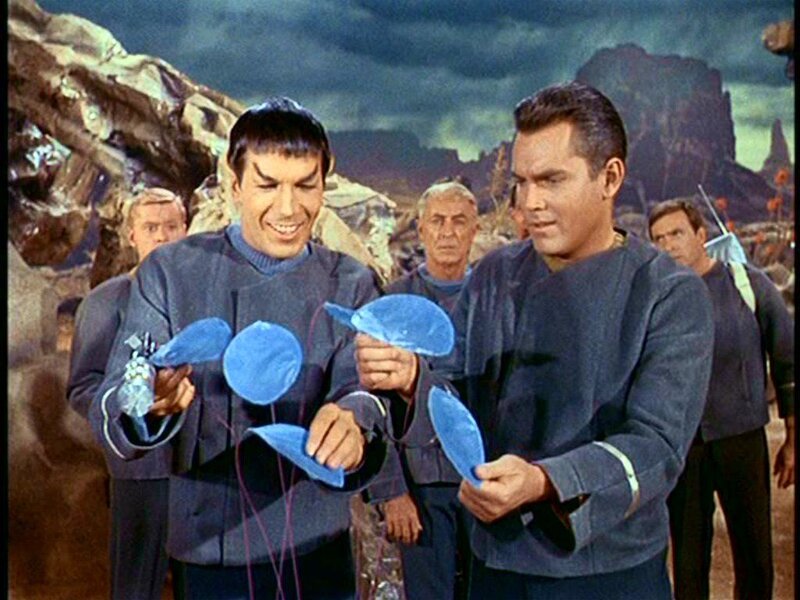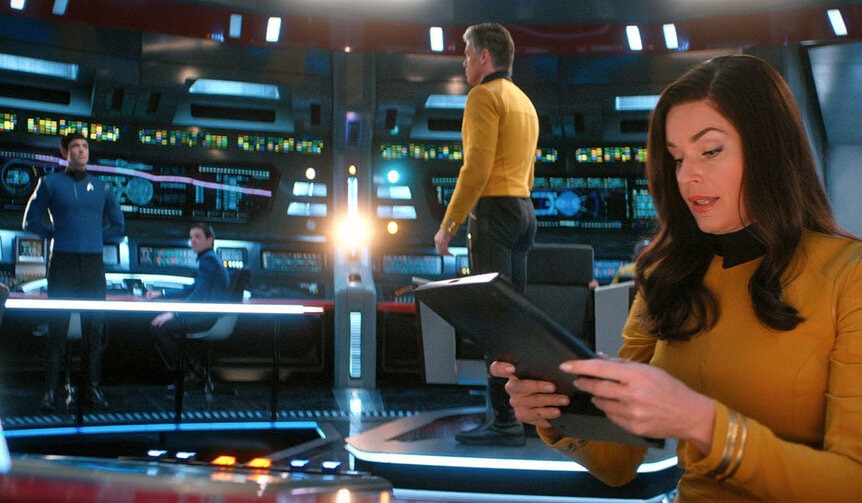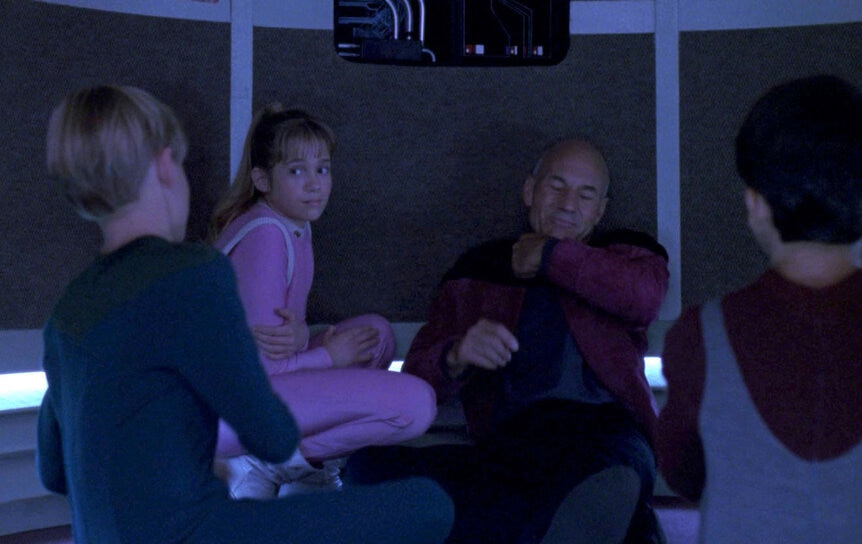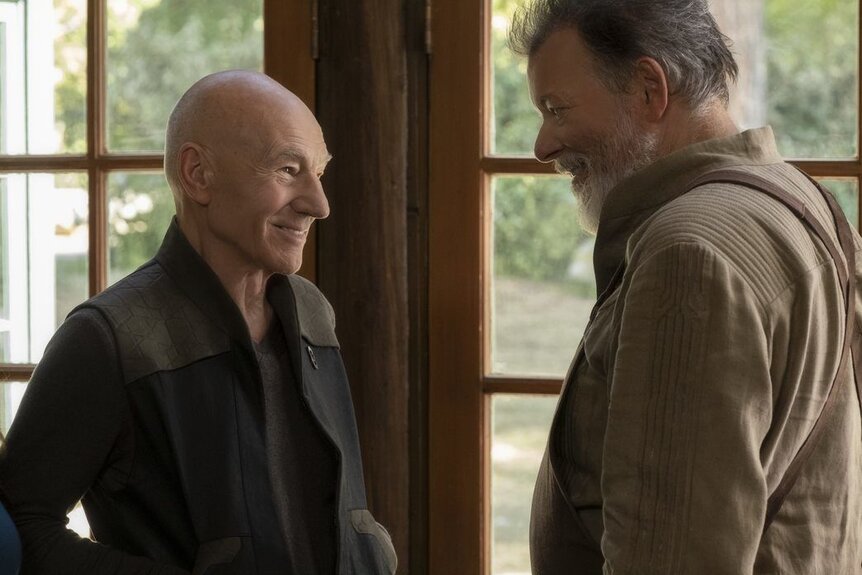Create a free profile to get unlimited access to exclusive videos, sweepstakes, and more!
Michael Chabon explains his new Star Trek short's connections to The Next Generation and Picard
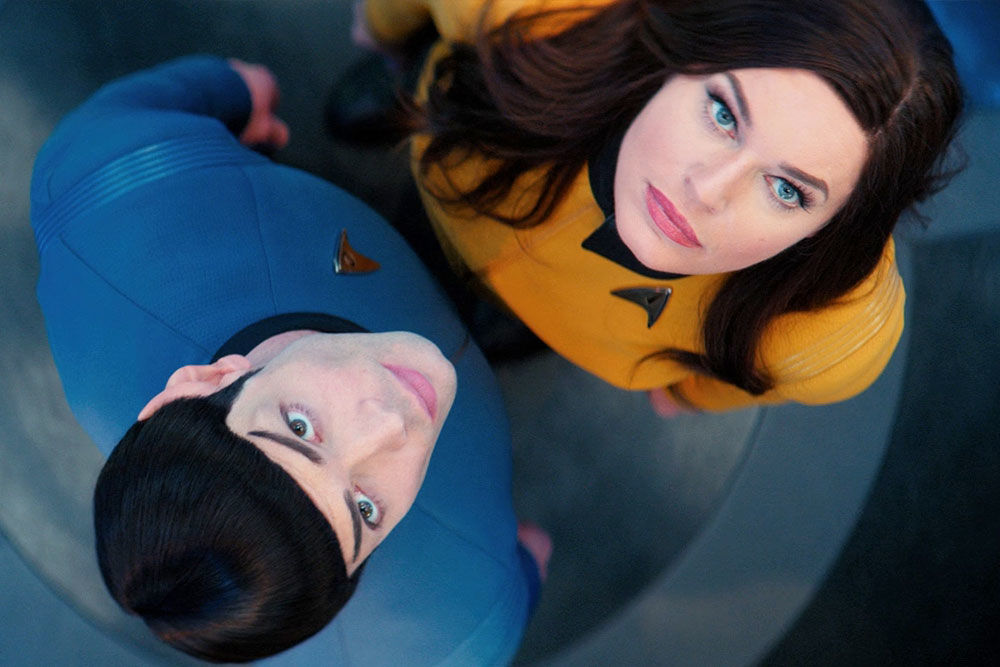
The showrunner of Star Trek: Picard and writer of the recent Spock and Number One-centric Short Treks episode "Q&A" could very well be the most talented fanfiction writer on the planet. Though he's won a slew of big-time awards (from the Pultizer to the Hugo) for his novels and works of nonfiction, Michael Chabon considers his writing on Star Trek to be no different than any other fanfiction writer.
"I mean, this is licensed and approved and maybe that invalidates its status as fanfiction," Chabon tells SYFY WIRE. "But I don't think so. I'm just sharing this with all my fellow fans out there who have always wondered about these questions."
The questions Chabon alludes to are front and center in the Short Treks episode "Q&A." First: why the heck did Spock smile in the originally unaired Star Trek Original Series episode "The Cage?" Second, after "The Cage," how come Spock seemed to borrow his entire personality from Number One?
In writing "Q&A" Chabon says he directly crafted a fictional response to these specific contradictions of old school Trek canon. SYFY WIRE talked with Chabon at length about writing "Q&A," reconciling "The Cage" canon, homages to a very famous Next Generation episode, and what it all means for Star Trek: Picard.
**SPOILER WARNING: Spoilers ahead for the Short Treks episode "Q&A."**
"There might not be another character quite like Number One in any other fandom, that I can think of," Chabon says of the steely USS Enterprise First Officer and navigator, circa the 2250s. "The subject of how to treat her canonicity is a subject that could probably only interest fans. I mean, you have to be more than a slightly casual fan to even know about her up until the second season of Discovery."
Originally played by Majel Barrett (the future wife of Gene Roddenberry) in the unaired 1964 pilot Star Trek episode, "The Cage," the character of Number One was intended to be a regular on the ongoing series. But, when the studio asked for extensive changes to the series format of Star Trek, for one reason or another, Barrett's role as Number One was eliminated.
Some sources contend this was because NBC wanted a different actress in the role, though the more commonly believed story was that having a female first officer on the Enterprise was a little too rock and roll for the studio brass of the era. In any case, series creator Gene Roddenberry eliminated Number One from the series and gave most of her personality traits to a rebooted version of Spock, the only character from "The Cage" who also appeared in Star Trek's second pilot, "Where No Man Has Gone Before."
From the 2016 oral history Trek book, The Fifty-Year Mission, here's a quote from Gene Roddenberry explaining how some of Number One's cooler and more cerebral traits were transferred to Spock: "When we had to eliminate a feminine Number One... I combined the two roles into one. Spock became the second in command, still the science officer but also the computer-like, logical mind never displaying emotion."
This fact is corroborated by OG Spock actor Leonard Nimoy in the same book: "A new pilot was written and Mr. Spock was in Number One's place as second-in-command as well as having some of the woman's computer-mind qualities. Vulcan unemotionalism and logic came into being."
Time-warp forward to 2019. Now, of course, not only was Number One made retroactively canon in the flashback sequences of the 1967 TOS episode "The Menagerie," but she also became a quasi-regular character played by Rebecca Romijn in the second season of Star Trek: Discovery. Which means there are still some lingering questions not only about her but her connection to a certain famous Vulcan, who, bizarrely, smiles in "The Cage." (This Spock smile is even visible in the repurposed retro recap scene for the Discovery Season 2 episode "If Memory Serves.")
"It's something I've mulled over and thought about since the very first time I saw 'The Menagerie,' when I was like 10 years old," Chabon explains. "And of course there was a Doylist explanation for why Spock is so, so different. But, the one thing that just can't be explained is from a Watsonian point-of-view was that; like what is with Spock? It's that smile. More than anything. Yeah, there's the shouty-ness and lots of other expressions of emotion that are sort of disturbing if you feel like you know the character of Spock. In the extra-fictional sense, Spock took over Number One's personality. And if we're going to really plunge into them and they're going to be co-existing with each other, we need to account for that."
Enter Chabon's fanfiction attempt to explain, in-universe, why Spock was a little more emotional in the 1964 scenes from the "The Cage" which were later repurposed as "flashbacks" for the 1967 episode "The Menagerie, Parts 1 & 2." In the episode, fans learn that Number One actually gives Spock advice to tone down some of his more human qualities, instructing him to hide his "freaky."
So, in a sense, in one very brief scene, Number One accidentally creates Spock's restrained personality as we know it.
"In a sense, he replaced her personality," Chabon says. "So, I wanted to tackle what happened outside of the extra-fictional and take that and put it into the fiction itself — and to show how Number One had this influence over Spock; sort of having her say, "If you want to be a commander, that to a degree, you're going to have to sacrifice yourself to duty and responsibility."
But the far-reaching, deep-cut canon commentary in "Q&A" isn't just limited to Spock and Number One. In fact, the entire episode could be read as a huge homage to a beloved 1991 episode of Star Trek: The Next Generation called "Disaster."
In "Q&A" Number One sings the Gilbert and Sullivan musical theatre number "I Am the Very Model of a Modern Major General," a song that is also sung by Geordi LaForge in "Disaster." Plus, while "Q&A" focuses on Spock and Number One being trapped in a turbolift, "Disaster" similarly strands Captain Picard in a broken turbolift with three school children. So, basically, if you're a hardcore TNG fan, "Q&A" might scan as a retroactive remake of "Disaster," albeit minus Picard singing in French.
And yet, Chabon says the overt similarities between "Q&A" and "Disaster" were totally subconscious.
"Well, you know, I'll be honest. I know that episode. I remember that episode. But it was really an accident. I think in the back of my mind, the idea of Picard getting trapped in the turbolift was certainly there. I've seen it at least twice, maybe more over the years," Chabon reveals.
But, he maintains the idea for Number One to sing Gilbert and Sullivan came not from a Next Generation reference, but instead, from Rebecca Romijn herself.
"That arose because it's in Rebecca Romijn's resume! I didn't know that. I inquired. I was already thinking of Number One and her quote-unquote 'freaky.' So I asked her if there was anything that Rebecca might be capable of that I didn't know, that the public didn't know, that maybe nobody knew, and that's one of the first things said she was a trained Gilbert and Sullivan singer," Chabon says. "And I said 'that's perfect.'
"Now, the fact that 'that's perfect' was my response is because I had this unconscious memory of the Gilbert and Sullivan from that episode ['Disaster']," he continues. "But it was not the first thing I thought of. The first thing I thought of was I can instantly see this cool, reserved woman who doesn't ever show anyone anything just suddenly busting out in this incredible patter song. It seemed immediately perfect and immediately true to me of Number One. So then, to have it all come together and kind of resonate as an homage to that episode of TNG, it was both accidental I think, but also, deep down, I'm a huge fan of TNG. Having that stuff in there. It's all in there somewhere."
In talking with Chabon, it's clear his love and knowledge of Star Trek runs very deep; he doesn't think of any of this as any other job and says he originally pitched the concept of "Q&A" as a two-episode package. The first idea is what became "Q&A": Spock's first day on the Enterprise. But he also reveals that he pitched a Short Treks that would depict Number One's last day on the Enterprise, too.
"Maybe I'll get to write the second part," Chabon says hopefully. But for now, he's focused on Picard, a show that has a very different writing process than the two Short Treks he's penned thus far. (Last year, Chabon made his Trek writing debut with the mysterious, far-future episode "Calypso.")
The biggest difference between writing Short Treks and Picard? Chabon says it's all about the collaboration.
"Writing Picard is very different than writing Short Treks," he says. "The story arc of Picard, shape of Picard, the characters, every aspect of Picard was co-created and simultaneously. This grew first by a core group who was Akiva Goldsman, me, Kirsten Beyer, and Alex Kurtzman. That core group generated overall plot arc in their broadest sense, and then, the Star Trek: Picard [writers'] room was eventually convened, which was a somewhat expanded version of that initial group who co-created and co-generated the storylines and the episodes, and what would happen in the individual episodes. The storylines are neither handed down from up on high nor was it me generating it by myself. It was very much a collaboration."
Chabon is also adamant that he understands why fans are often suspicious of changes to the beloved Trek canon, but wants Trekkies everywhere to know that Picard is coming from the same place of deep love as his Short Treks.
He says that even though he's a long-time Trek fan, that skepticism has been his kneejerk reaction to every new version of the franchise. In a way, Chabon says he understands why the haters of the new Trek often default to negativity.
"Fans are just afraid of change, you know?" he says. "You want change for the better. But that's so much harder to imagine sometimes than change for the worse."
But, he feels confident that Picard is a show made for the fans by fans, and hopes that fans will accept it. "I can't wait for you to see Picard. It's coming from exactly the same place in my mind and my heart and my imagination as this short did," he reassures. "I think fans are going to love it."
Star Trek: Picard hits CBS All Access on January 23. Michael Chabon's latest Short Treks episode "Q&A" is streaming now.
